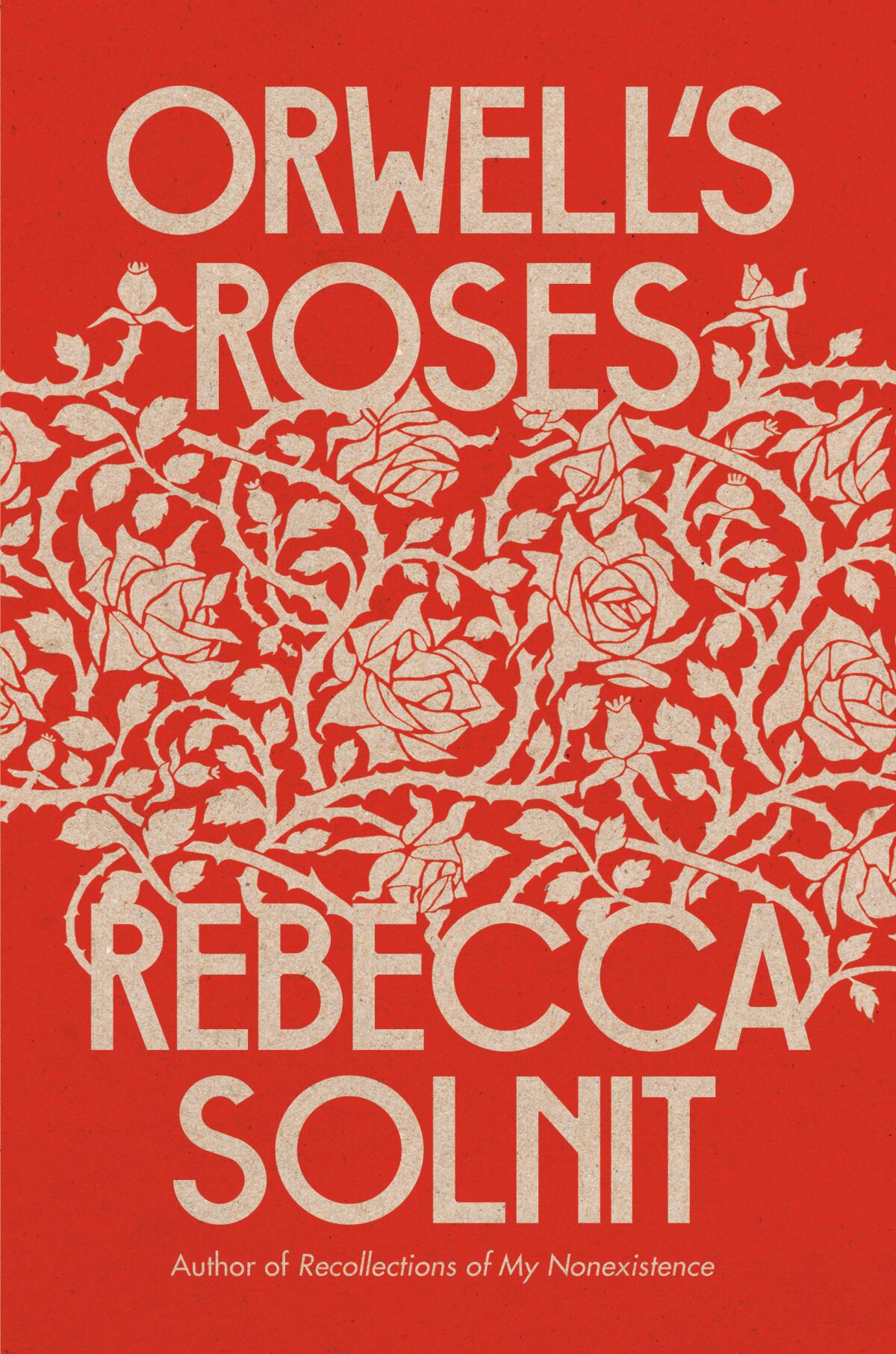What does George Orwell’s garden tell us about his writing, you ask? Everything

On the Shelf
Orwell's Roses
By Rebecca Solnit
Viking: 220 pages, $28
If you buy books linked on our site, The Times may earn a commission from Bookshop.org, whose fees support independent bookstores.
Essayist, cultural critic and activist Rebecca Solnit’s two-dozen-plus books have wandered all over the map: paeans to walking and roaming off course (“Wanderlust” and “A Field Guide to Getting Lost”); an award-winning biography of photographer Eadweard Muybridge (“River of Shadows”); and of course, her oft-cited memoirs about the damaging repercussions of living in a misogynistic world (“Men Explain Things to Me” and “Recollections of My Nonexistence”).
George Orwell too was known to roam, which might be one reason why Solnit’s latest book, “Orwell’s Roses,” is, from its beautiful cover to its impassioned coda, one of her very best. This multifaceted tribute to one of her principal literary influences is a reassessment of a writer best known for his fervent criticism of totalitarianism as “a threat not just to liberty and human rights but to language and consciousness.”
Solnit’s view of Orwell broadened and softened after she came to recognize that his deep appreciation for some of life’s cozier pleasures — including domestic comfort, the natural landscape and gardening — underpins and pervades his work. In rereading his books and essays, she writes, “I found another Orwell whose perspectives seem to counterbalance his cold eye on political monstrosity.”
“Orwell’s Roses” is at once a biographical study of this champion of freedom, an impressive work of cultural and literary criticism and a testament to Solnit’s far-ranging curiosity. Known for her penchant for digressions and tangents, Solnit leaves no row unhoed as she simultaneously explores the roots of Orwell’s prolific literary output and the fecund history of roses.
Of course Big Brother isn’t just watching us anymore — he’s listening to our cell phone and FaceTime conversations, friending us on Facebook, following us on Instagram (just as we are often following Him).
One of the many works Solnit revisits is Orwell’s 1946 essay “A Good Word for the Vicar of Bray,” which touches on, among other subjects, the idea that planting a tree is a “botanical contribution to posterity.” In appreciation of one of her own literary proclivities, she lauds the piece as “a triumph of meandering.”
“Orwell’s Roses” is exactly this kind of triumph, a delight of digressions. This is in part due to Solnit’s nose for a good story, but also because, especially in this book, she artfully trains her branching offshoots on a supportive trellis: Orwell’s chronological lifespan (1903-50). She further ties her narrative together by repeating her book’s opening line at the start of many chapters: “In the spring of 1936 a writer planted roses.”

Among Solnit’s less expected forays is a chapter on the allure of Ralph Lauren’s Anglophilic chintz cabbage rose fabrics of the 1980s, which “beckoned from a never-never land of an idealized past, the past of the pastoral and paradise.” Another fascinating byway leads into the career of Tina Modotti, photographer and ardent supporter of revolutionaries, whose teacher and married lover, Edward Weston, followed her from California to revolutionary Mexico in 1923. This was the year before Modotti produced “Roses, Mexico City,” her sensuous modernist closeup of four white blossoms in various stages of opening. By 1931, Modotti abandoned art and roses and moved to Moscow to support Stalin’s Russia — a repressive regime, as Solnit makes clear, that later played a major role in Orwell’s work, including “1984.”
Not everything comes up roses in this study. Solnit’s pursuit of the provenance of Orwell’s cherished blossoms leads her to some dark places. Like Britain’s dependence on coal — the human costs of which Orwell reported on in “The Road to Wigan Pier” — the Western world’s love of roses has spawned another destructive, abusive industry. In 2019, Solnit pulled off a rare tour of one of the rose factories that were supposed to supplant coca production in Bogotá, Colombia. The terrible working conditions she describes in the country’s vast greenhouses, which supply some 80% of the roses sold in the United States, may put you off your next Valentine’s Day bouquet. “The contemporary world is full of things that look beautiful and are produced through hideous means,” she writes.
Orwell’s 5 greatest essays: No. 1, ‘Politics and the English Language’
Solnit also digs into Orwell’s deep family ties to colonialism. The prickly truth, she learns, is that “Orwell is descended from colonists and servants of empire who lived off the fat of others’ land and labor.” Eric Blair — who took his pen name at 30 — was born in India in 1903, where his father worked in opium production, an insidious “counterbalancing commodity” meant to offset Britain’s many Chinese imports. Another somewhat inconvenient truth: Instead of proceeding to university after his spotty performance at Eton (which he attended on scholarship), Orwell worked as a policeman in the British imperial service in Burma for five years during the 1920s. It helped shape his political consciousness and led to his first novel, “Burmese Days” (1934), a dark portrait of the waning British Raj.

However laudatory, Solnit’s tribute to Orwell does not ignore his “significant blind spots” around gender, including his failure to review books by women writers or to recognize “how marriages and families can become authoritarian regimes in miniature.” She notes that he was “better at recognizing racism,” though he was a product of his age, “strategically oblivious to inequalities we have since worked hard to recognize.”
The central premise of “Orwell’s Roses” is that the power and effectiveness of Orwell’s warnings on totalitarianism’s ongoing threats to liberty, human rights, language and truth were enriched by his strong underlying commitment to “the things he valued and desired.” Among them, Solnit argues in this humanizing portrait, was the peaceable kingdom of edible and decorative plants he so avidly cultivated at home.
McAlpin reviews books for The Times, NPR, the Wall Street Journal and other publications.
Every woman knows what it’s like to be patronized by a guy who won’t let facts get in the way.
More to Read
Sign up for our Book Club newsletter
Get the latest news, events and more from the Los Angeles Times Book Club, and help us get L.A. reading and talking.
You may occasionally receive promotional content from the Los Angeles Times.






